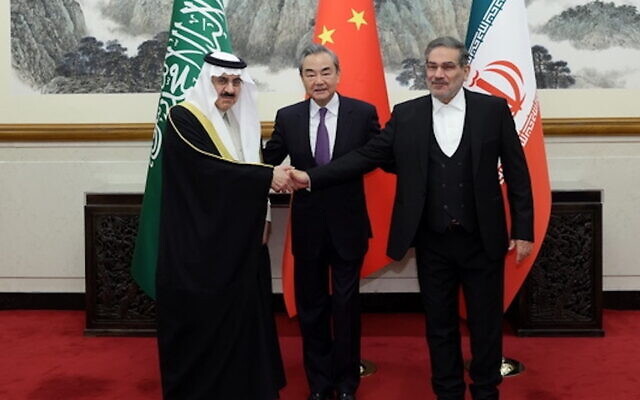After naming terms for normalisation with Israel, Saudi Arabia restores relations with Iran
Saudi officials reach an agreement with Iran, brokered by China in Beijing, that restores diplomatic ties between the two countries.

Saudi Arabia has taken significant steps this week toward better relations with two countries that see each other as sworn adversaries: Israel and Iran.
The kingdom has set terms for what it would need from the United States as a price for normalising relations with Israel: a security agreement of some kind with the United States, a civilian nuclear program and decreased restrictions on U.S. arms sales.
Then Saudi officials reached an agreement with Iran, brokered by China in Beijing, that restores diplomatic ties between the two countries. Saudi Arabia and Iran are regional rivals that have competed for influence across the Middle East, and that have taken opposing sides in Yemen’s long-running civil war. Saudi Arabia ceased relations with Iran in 2016. Now, they have pledged to reopen embassies in each other’s countries within two months.
The two developments have created a complex picture for Israel, whose prime minister, Benjamin Netanyahu, has publicly sought a normalisation deal with Saudi Arabia. Establishing full relations with Saudi Arabia would add the powerful country to the list of Arab states that have signed normalisation deals with Israel in recent years under a framework called the Abraham Accords.
The Biden administration has also said it would like to expand the accords. If Saudi Arabia and Israel did establish full ties, it would be a milestone in Arab-Israeli relations, which have historically been hostile.
Part of Netanyahu’s rationale for wanting to normalise relations with Saudi Arabia is that the relationship would allow the two countries to better confront Iran’s ambitions, including its nuclear program. But Saudi Arabia’s public thaw in relations with Iran complicates that picture. Included in the reestablishment of Saudi-Iranian ties is the revival of a security cooperation pact, according to The New York Times.
Saudi Arabia and Israel both abut the Gulf of Aqaba, and Saudi Arabia’s publicising a list of demands in exchange for normalisation with Israel isn’t its first foray into trying to facilitate a diplomatic agreement with the state. More than two decades ago, a Saudi-led peace plan, the Arab Peace Initiative, promised full relations between Israel and the Arab world in exchange for full Israeli withdrawal from all territories it captured in the 1967 Six Day War, the establishment of a Palestinian state and “a just solution to the Palestinian refugee problem.” Israel has not viewed the proposal as a basis for negotiations, and Saudi Arabia has previously said it wouldn’t establish full ties with Israel unless a Palestinian state is established.
Netanyahu does not appear to have commented directly on either the Saudi list of demands or the kingdom’s restored relations with Iran. But in an interview with the Italian newspaper La Repubblica, published before the Saudi terms were announced, Netanyahu said Arab states “can see we share a strategic interest” and added that “they see our technology and innovation and understand the opportunity it represents for the entire region.”
“Riyadh has released many statements,” he added, referring to the Saudi commitment not to normalise relations with Israel before the establishment of a Palestinian state. “But naturally I believe that the peace agreement between us and the Saudis will lead to an agreement with the Palestinians, provided they agree to recognise the existence of Israel.”
On Friday, the Israeli news website Walla quoted an “Israeli official” who spoke about the Saudi-Iran agreement to the reporters accompanying Netanyahu on a visit to Italy. The anonymous official blamed the agreement on the “weakness” of the United States and the previous Israeli government.
“There was a feeling of American and Israeli weakness, and so Saudi Arabia turned to different channels,” the official said, according to Walla. “It was clear where they were going.”
Yair Lapid, Netanyahu’s immediate predecessor and the leader of Israel’s parliamentary opposition, criticised Netanyahu over the Saudi-Iran agreement.
“The agreement between Saudi Arabia and Iran is a total and dangerous failure of the foreign policy of the Israeli government,” he tweeted. “It’s a collapse of the regional wall of defence that we began to build against Iran.”

Thank you for helping to make Jewish News the leading source of news and opinion for the UK Jewish community. Today we're asking for your invaluable help to continue putting our community first in everything we do.
For as little as £5 a month you can help sustain the vital work we do in celebrating and standing up for Jewish life in Britain.
Jewish News holds our community together and keeps us connected. Like a synagogue, it’s where people turn to feel part of something bigger. It also proudly shows the rest of Britain the vibrancy and rich culture of modern Jewish life.
You can make a quick and easy one-off or monthly contribution of £5, £10, £20 or any other sum you’re comfortable with.
100% of your donation will help us continue celebrating our community, in all its dynamic diversity...
Engaging
Being a community platform means so much more than producing a newspaper and website. One of our proudest roles is media partnering with our invaluable charities to amplify the outstanding work they do to help us all.
Celebrating
There’s no shortage of oys in the world but Jewish News takes every opportunity to celebrate the joys too, through projects like Night of Heroes, 40 Under 40 and other compelling countdowns that make the community kvell with pride.
Pioneering
In the first collaboration between media outlets from different faiths, Jewish News worked with British Muslim TV and Church Times to produce a list of young activists leading the way on interfaith understanding.
Campaigning
Royal Mail issued a stamp honouring Holocaust hero Sir Nicholas Winton after a Jewish News campaign attracted more than 100,000 backers. Jewish Newsalso produces special editions of the paper highlighting pressing issues including mental health and Holocaust remembrance.
Easy access
In an age when news is readily accessible, Jewish News provides high-quality content free online and offline, removing any financial barriers to connecting people.
Voice of our community to wider society
The Jewish News team regularly appears on TV, radio and on the pages of the national press to comment on stories about the Jewish community. Easy access to the paper on the streets of London also means Jewish News provides an invaluable window into the community for the country at large.
We hope you agree all this is worth preserving.





















